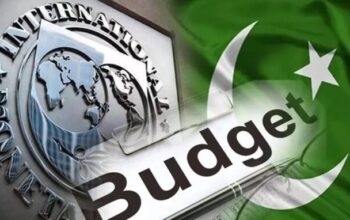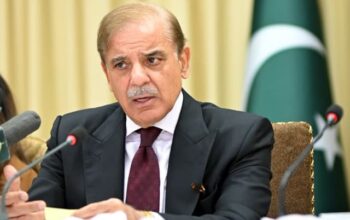By Staff Reporter
KARACHI: Pakistan’s exports to the US are poised to take a hit after President Donald Trump unleashed a 29 percent tariff on Pakistani imports, part of a broad salvo hitting dozens of countries as he ramps up a global trade war.
Analysts see near-term pain for Pakistan’s export-heavy economy but potential openings if it can adapt fast.
The reciprocal duties—matching Pakistan’s 58% tariff on U.S. goods—come alongside levies on rivals and allies alike, from India’s 26% to Cambodia’s 49%. Trump, wielding a board of trade stats at the announcement, pitched it as a reset of “unfair” global commerce.
Analysts warn that the tariffs could erode Pakistan’s competitiveness in the U.S., its largest single-country export destination.
Pakistan, which sends $6 billion in goods annually to the U.S.—18% of its total exports—faces immediate risks. Textiles, nearly 80% of its $3.6 billion in U.S. sales through July of fiscal 2025, are especially vulnerable.
Analysts warn that the tariffs could erode Pakistan’s competitiveness in the U.S., its largest single-country export destination.
“The tariffs will dent demand for Pakistani goods—a negative for the country,” said Mustafa Pasha, chief investment officer at Lakson Investments Ltd. in Karachi. “Trump wants to reset world trade, thus, he has imposed tariffs globally. Pakistan now needs to assess its position relative to its competing countries.”
Textile manufacturers, a linchpin of Pakistan’s economy, are bracing for impact.
Textile giant Interloop Ltd.’s CEO, Musadaq Zulqarnain, labeled it Trump’s “biggest assault yet” on global trade. In a social media post, he flagged Pakistan’s edge over Vietnam (17%), China (25%), and Bangladesh (8%), but a gap to India (3% disadvantage), Turkey (19%), and Jordan (6%). “U.S. sales will drop regardless,” he said, pinning outcomes on negotiation savvy.
“Regardless of circumstances, sales in the US are expected to decline,” he added.
Ali Hasanain, an economics professor at Lahore University of Management Sciences, downplayed the GDP hit. US exports are under 1.5% of Pakistan’s total. “Even a total wipeout wouldn’t match our self-inflicted slumps,” Hasanain said. Diplomatic ties? Stable, with US backing for Pakistan’s IMF deal mattering more.
“US is one of Pakistan’s most important trade partners, and the one with which we run the largest trade surpluses. Still, the U.S. market’s heft is unmatched.”
“Pakistan should continue to seek more diverse markets for our products, while at the same time working with other countries to join multilateral efforts to dissuade the US from staying on this course, which will shrink global trade overall and dampen economic activity moving forward.”
Adil Nakhoda, an economist at Karachi’s Institute of Business Administration, suggested leaning on the EU for textile sales and importing U.S. inputs to snag tariff breaks. “Countries with big U.S. surpluses are targets—Pakistan can tweak that ratio,” he said.
“My take on this is that the countries with larger trade surpluses with the US are being targeted based on the proportion of their trade surplus to total bilateral exports to the US.”
Sajid Amin of the Sustainable Development Policy Institute predicted a quick hit but saw upside. “Our tariffs beat Bangladesh and Vietnam—innovation could turn this around,” he said. Subsidies might help, though IMF constraints loom. Retaliation? Unlikely, given Pakistan’s 58% U.S. duty and minor trade clout. “For the U.S., we’re a blip,” he said.
Brokerage Topline Securities noted that Pakistan’s exports account for 0.16pc of total US imports of $3.36 trillion in 2024.
“Although imports from Pakistan in US makes only 0.16pc of total US Imports, however, the number is quite significant from Pakistan’s perspective.” “We believe, theoretically, due to Pakistan’s duty disadvantage with India, Pakistan textile exports may face some pressure, however, higher duties on Bangladesh and Vietnam shall provide some respite to Pakistan exports in US.”
Copyright © 2021 Independent Pakistan | All rights reserved




